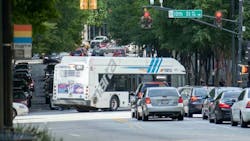U.S. Rep. Johnson introduces bill that would provide $80 billion to transit over four years
U.S. Rep. Hank Johnson (D-GA-04) has re-introduced his Stronger Communities Through Better Transit Act. The proposal would authorize $80 billion in transit funding over four years to support operating budgets.
The bill was first introduced in 2021, with an aim to provide funding to transit agencies for more frequent transit service and to prioritize service to communities with poor service, disadvantaged communities and areas of persistent poverty. Under Johnson’s proposal, federal funding recipients would receive 50 percent of their average annual operating costs based on a three-year period. Funding recipients would also be required to report certain statistics to the Federal Transit Administration, including frequency of service, how many jobs and essential services are accessible by transit and show that a community survey is conducted every two years.
“Transit in our communities is as essential as food on our tables, clothes on our backs and a roof over our heads,” said Rep. Johnson. “This kind of funding is a game-changer for Atlanta and communities across the nation. Simply put, people could get to more places in less time using transit. Jobs, schools and other daily destinations that previously took too long to reach would become more accessible. People would feel less strain on household budgets as their transportation costs shrink. They would have more time to spend with their families as time spent commuting falls.”
What’s included in the proposed Stronger Communities Through Better Transit Act:
-
$20 billion per year would be authorized in federal matching funds for public transportation operating expenses associated with improving transportation service and increasing transit ridership.
-
Funds would be distributed to every recipient of FTA urbanized area and rural area formula funds, proportional to their share of operating costs, which would be 50 percent of their average annual operating costs during a three-year period.
-
Increase the federal share of operating costs rural transit agencies to 80 percent (matching the federal share these agencies are entitled to for capital projects).
The proposal comes at a time when transit agencies are facing deficits brought on by a combination of increased expenses due to inflation, continued reduced ridership as hybrid work becomes more normal and a persistent hiring crisis that has resulted in some agencies reducing service due to lack of available operators.
“Getting people to work and providing essential services is the primary purpose of the transportation system and it fails if it can only do that for people who have the money and ability to drive,” said Director of Transportation for America Beth Osborne. “With the Stronger Communities Through Better Transit Act, Rep. Johnson not only offers needed support for increased transit service to connect people with the things they need, but for the high quality, dependable transit service that people require for true access to opportunity.”
Transport Workers Union of America (TWU) supports the proposal, saying it “would dramatically improve the lives of working men and women.”
“[This legislation] would replace the government’s current transit funding scheme, which is completely asinine and void of common sense. Transit agencies would be able to increase and improve bus and rail service so working communities don’t just survive, but thrive,” said TWU International President John Samuelsen.
Text of the proposed Stronger Communities Throug hBetter Transit Act is linked here.
About the Author

Mischa Wanek-Libman
Group Editorial Director
Mischa Wanek-Libman is director of communications with Transdev North America. She has more than 20 years of experience working in the transportation industry covering construction projects, engineering challenges, transit and rail operations and best practices.
Wanek-Libman has held top editorial positions at freight rail and public transportation business-to-business publications including as editor-in-chief and editorial director of Mass Transit from 2018-2024. She has been recognized for editorial excellence through her individual work, as well as for collaborative content.
She is an active member of the American Public Transportation Association's Marketing and Communications Committee and served 14 years as a Board Observer on the National Railroad Construction and Maintenance Association (NRC) Board of Directors.
She is a graduate of Drake University in Des Moines, Iowa, where she earned a Bachelor of Arts degree in Journalism and Mass Communication.
